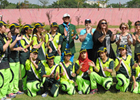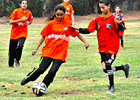International Day of the Girl Child | 2016
![[IMAGE]](/sites/default/files/Field%20Office%20ESEAsia/Images/2016/10/30001723685_b9f8f7812f_o-675px.jpg?la=en&h=393&w=675)
| Q&A with UN Women Regional Director | Girls’ Voices | Youth Bloggers | Featured Stories |
The world’s 1.1 billion girls are part of a large and vibrant global generation poised to take on the future. Yet the ambition for gender equality in the Sustainable Development Goals (SDGs) highlights the preponderance of disadvantage and discrimination borne by girls everywhere on a daily basis. Only through explicit focus on collecting and analyzing girl-focused, girl-relevant and sex-disaggregated data, and using these data to inform key policy and program decisions, can we adequately measure and understand the opportunities and challenges girls face, and identify and track progress towards solutions to their most pressing problems.
With this in mind, the theme for this year’s International Day of the Girl (11 October) is Girls’ Progress = Goals’ Progress: What Counts for Girls. While we can applaud the ambition and potential of the SDGs for girls, and recognize how girls’ progress is good not only for girls, but also for families, communities and society at large, we must also take this opportunity to consider how existing gaps in data on girls and young women, lack of systematic analysis, and limited use of existing data significantly limit our ability to monitor and communicate the wellbeing and progress of half of humanity.
Q&As with UN Women Regional Director
Kim: Girls are in much easier position to be targeted for sexual violence. What is the UN doing to protect them from such danger?
Miwa: Sexual violence against women and girls is a very serious issue. It affects 1 in 3 women around the world, and some of the reports coming out of this Asia Pacific region gives concerns there’s even more. What men and boys might not see as violence, could very much constitute violence when it’s experienced by women and girls. So we very much start out from raising awareness about what constitutes violence against women and girls. We of course work with the governments to have proper legal measures to prevent violence, but also to look at various factors that lead to structural violence against women and girls.
Oh: Would it be possible for normal girls like us to take high positions in our work places?
Miwa: Yes, of course! And this is where we need to start saying “yes”. Boys and men have a lot of role models and examples of people in leadership positions. Women and girls may have less. So this is of course a factor. But if we keep on modeling ourselves on what is available today, we will never have any progress. When you think of human civilization and all the progress that we have made, it was to push that envelope, to go a little bit further. So to make sure that you are that role model to take leadership position. All the limits that you might feel exist in your life, try to take them aside. Because a lot of the “limits” are very much within our mind. And when we are determined to remove those limits, you’ll be very surprised with what you can do.
Son and friends: What can UN do to change stereotypes and social norms on women?
Miwa: Changing stereotypes and social norms is really at the core of what we need to be working on. UN can try do a lot of things and we in fact do by bringing around the stories of women and girls who broke the barriers and got into positions, or making difference in the society in the way that women and girls were not expected in the past, widely publicize it so that it reaches many people to inspire them to also be that change. We try to work with the media to see ways we can send positive image of women and girls to not limit people through gender. TV, movies, music, a lot of the media industry and how ordinary people can share their images through social media is also shaping the stereotypes. This day gives us a great opportunity to start talking about the things that you can also contribute to change the norms and stereotypes, because at the end of the day, it’s what you talk and do every day that shapes the norms of the society.
Girls’ Voices
From Viet Nam
Students, Olympis School, Ha Noi, Viet Nam
Olympia School in Ha Noi, Viet Nam is a strong advocate for gender equality and SDGs. Girls from Viet Nam sent message to celebrate International Day of the Girl Child. Listen to what world these girls want to live in and what needs to change to achieve the dream.
From Thailand
Amita Beijaflor Krich, Harrow International School, Bangkok
Two stop-motion videos, produced by Amita B. Krich (12), Thailand, “United Rations” and “Kid, I'm gonna make you a starfish” deliver strong messages to girls in Asia-Pacific. “United Rations” is a story about representative foods fighting each other over being the best food. “Kid, I’m gonna make you a starfish” is a story of a starfish who fled from home to become a star. Using paper and her creativity, Amita advocates and wishes for a peaceful world where every girl can shine as who they are.
Patcharamon, Triam Udom Suksa School, Bangkok
Patcharamon Charoenchai (16) is a high school student in Thailand. At school, she volunteered to become a leader in drama club. She believes girls can do what boys can do, some-times even better. She wants her friends and all girls to speak out their voices because girls have the power to change the world and those voices must be heard.
Youth Bloggers
At least 750 million of young persons live in Asia and the Pacific. Their active involvement, participation and voice is essential to achieve gender equality. UN Women’s Youth’s Voice is an open space for young people in the region to express themselves and contribute with their ideas and enthusiasm to build a fairer and more equitable world for all.
Tanyalak Thongyoojaroen, Thailand
Tanyalak, a young feminist and human right activist who advocates for Gender Equality and she loves sports and out door activities. Read more on her blog
Fasiha is a young Pakistani blogger at The Inflectionist and a regular contributor to the EmpowerWomen.org site. Read more on her blog
Featured Stories
UN Women, the United Nations Entity for Gender Equality and the Empowerment of Women, and UNICEF, the United Nations Children’s Fund, commemorated the UN International Day of the Girl Child on 8 October with a cricket day for girls. The event took place at Pakistan Sweet Homes in Islamabad, and more than 70 girls from 4 different schools and 15 women from the expatriate community participated. A total of 350 spectators, organizers and cricket players took... more
In Karachi, a football victory for girls’ rights
It was just a one-hour game at a school sports ground, and some of them had never touched a football before. But for all the schoolgirls who came out to play, it was something special. On 25 February, UN Women Pakistan teamed up with The Diya Women’s Football Club (DWFC) to organize a football match for 35 schoolgirls from less-privileged areas of Karachi. At the sports ground of St. Patrick’s High School, team... more



